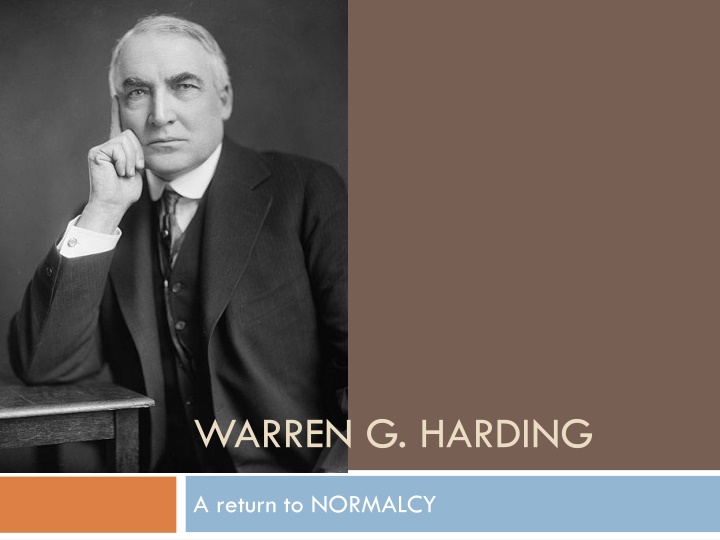
Warren G. Harding Administration and Scandals in the 1920s
Explore the presidency of Warren G. Harding, from his campaign promising a return to "normalcy" after World War I to the various scandals that plagued his administration, including the Tea Pot Dome Scandal. Learn about key events, such as the Fordney-McCumber Tariff, the Dawes Plan, and the controversial actions of the Ohio Gang. Despite some international contributions, Harding's presidency was marred by corruption and scandal, culminating in his sudden death in 1923.
Download Presentation

Please find below an Image/Link to download the presentation.
The content on the website is provided AS IS for your information and personal use only. It may not be sold, licensed, or shared on other websites without obtaining consent from the author. If you encounter any issues during the download, it is possible that the publisher has removed the file from their server.
You are allowed to download the files provided on this website for personal or commercial use, subject to the condition that they are used lawfully. All files are the property of their respective owners.
The content on the website is provided AS IS for your information and personal use only. It may not be sold, licensed, or shared on other websites without obtaining consent from the author.
E N D
Presentation Transcript
WARREN G. HARDING A return to NORMALCY
Historical Background Republican Senator from Ohio Takes office in 1921 VP: Calvin Coolidge Secretary of State: Charles Evans Hughes
Election of 1920 Progressivism v. Laissez-faire Opponents: Ohio Governor James M. Cox and running mate Assistant Secretary of the Navy Franklin D. Roosevelt A Return to NORMALCY
Contributions 1921 Harding invites: Great Britain, Japan, France, Italy to a conference. Charles Evans Hughes urges delegates that no more warships be built for the next ten years.
Fordney-McCumber Tariff 1922 raised taxes on US imports to 60%. Protected US businesses from foreign competition. Dawes Plan Charles G. Dawes loans Germany $2.5 billion to pay back France and Britain, who need the money to pay back the US. Appoints ex-President Taft to the Supreme Court as Chief Justice.
Scandals Ohio Gang the president s poker-playing friends whom he gave cabinet positions to. Every Wednesday night Harding would sneak out, followed by the Secret Service, to one of his friend s homes to gamble, play poker, and meet women.
The Tea Pot Dome Scandal Fairly late and fairly drunk Harding signs some papers brought to him by his friend: US Navy Secretary of the Interior Albert B. Fall. Transfers ownership of oil rich land in Teapot Dome, Wyoming and Elk Hills, CA from the navy to the Interior Department. Fall secretly leased the land to two private oil companies who sold the oil for their own profit.
Fall claims later on that the contracts were in the government s interest but he is found to have suddenly received $400,000 in loans,bonds, and cash . Summer of 1923 Harding goes to Alaska and then to California to take a breather and passes away from
a heart attack/ stroke. Harding had been poisoned by his wife, Florence Harding, who apparently had caught on to him and his girlfriends, and had slowly poisoned him with a small amount of arsenic in his coffee each morning for over a year.
August 2, 1923 Harding passes away in San Francisco, CA. Calvin Coolidge is sworn in as President by his father on the family Bible under the light of their kerosene lamp.
CALVIN COOLIDGE 1923 - 1929
Silent Cal Had a reputation as a quiet man. Asocial at times. Dorothy Parker, screen writer, exchange: Parker: "Mr. Coolidge, I've made a bet against a fellow who said it was impossible to get more than two words out of you." Coolidge: You Lose.
Contributions Revenue Act 1924, 1926, 1928 lower taxes for everyone, and even eliminating income tax. Tight federal budget, lowered national debt. Limited government involvement in business by vetoing bills for subsidizing farmers during surplus as well as a Veteran s bonus bill. Kellog-Briand Pact of 1928 - committed signatories including the U.S., the United Kingdom, France, Germany, Italy, and Japan to "renounce war, as an instrument of national policy in their relations with one another.
